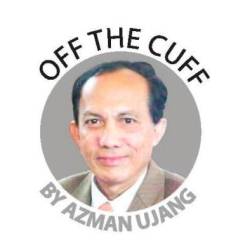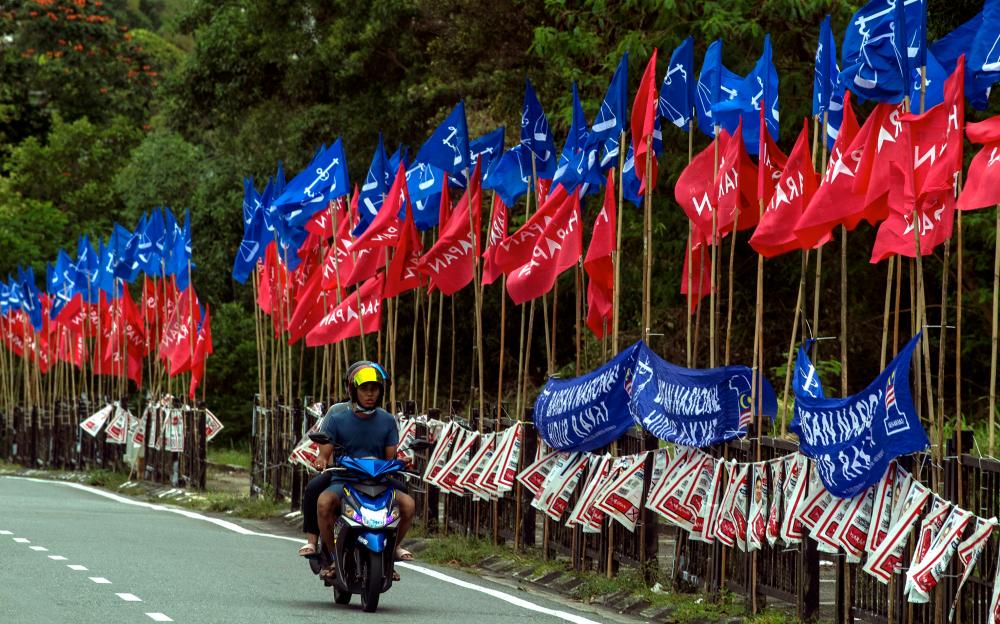WITH the 15th general election (GE15) round the corner, it is only to be expected that political parties are working overtime to outdo each other with all sorts of populist plans to woo voters. What more in this overcrowded GE15, which rightfully has been described as the “mother of all elections”.
One such populist move that has been kicking up immense discussion is the pledge by both the Barisan Nasional (BN) and arch-rivals Pakatan Harapan (PH) coalitions to appoint not one but three deputy prime ministers (DPMs) if they make it to Putrajaya in the Nov 19 election.
Their suggestion is for a DPM each from Sabah, Sarawak and the peninsula.
Fellow columnist Datuk Seri Wong Chun Wai in his usual candour posed this question: “Why do we need two or three DMPs? Are we not drowning with ministers, deputies and special envoys who barely make a ripple in the already bloated Cabinet?”
For the record, the caretaker Cabinet before Parliament was dissolved on Oct 10 had 30 ministers, and coupled with 40 deputy ministers, is undisputedly the world’s largest or most bloated, as many would like to call it.
The “great DPM poser”, as Wong calls it or the “lure of three DPMs” as the headline suggests, is actually a strategic move by both BN and PH as they are aware of the pivotal kingmaker role both the East Malaysian states can play in GE15.
According to Wong, the two competing coalitions are aware that no side will have the edge to form the next federal government without the support of parties from these two largest states. This is especially crucial as far as Sarawak is concerned where the Gabungan Parti Sarawak, led by Premier Tan Sri Abang Johari Tun Openg, is expected to unleash a tsunami by winning at least 26 out of the 31 parliamentary seats in the state.
But in Sabah, where politics is always messy, things are more complicated, and it is not that easy to predict how many of the 25 seats up for grabs the coalition partners there can deliver.
Interestingly enough, long before BN and PH came out with their three DPMs strategy, I wrote a piece under this column dated Aug 20 last year, or 15 months ago, headlined: “Appoint next DPM from East Malaysia”.
In it, I mentioned the two-hour audience the Yang di-Pertuan Agong Al-Sultan Abdullah Ri’ayatuddin Al-Mustafa Billah Shah had three days earlier with political party leaders, where His Majesty decreed that he wanted a new political landscape for the nation.
It took place shortly after then prime minister (PM), Tan Sri Muhyiddin Yassin, tendered his resignation after Umno withdrew its support for the Perikatan Nasional government that he led.
The nation then was once again embroiled in political turmoil and Muhyiddin did what his predecessor Tun Dr Mahathir Mohamad did one and a half years earlier when the PH government was toppled via the so-called Sheraton Move.
I wrote in that column that there could not be a better or more dignified start towards implementing the royal decree for a new and harmonious political landscape than by appointing an MP from either Sabah or Sarawak as the next DPM.
The column was written just a day or two before Umno vice-president Datuk Seri Ismail Sabri Yaakob, now the caretaker PM, was appointed PM, and Malaysia made history by having four PMs in just three years from 2018, when BN lost power for the first time in 61 years.
In other words, I had urged the new PM to make such an appointment but as it turned out, there was no DPM appointment in the Ismail Sabri administration. Instead, three senior ministers were appointed.
Ismail Sabri himself was appointed DPM by Muhyiddin without the latter realising that hardly a month later, he would quit and be replaced by his newly-appointed deputy.
Luring voters aside with the carrot of appointing a DPM each from Sabah and Sarawak, this year marks 59 years both our biggest states have been part of the federation, but the highest their MPs have risen to were appointments as ordinary Cabinet posts.
There have been so many DPMs appointed over the decades but all from Peninsular Malaysia.
It is not only about time, but long overdue, that the DPM post be reserved for Sabah or Sarawak if two DPMs mean further bloating the Cabinet. And we certainly do not need three DPMs.
In fact, it was reported last year before Ismail Sabri took over as PM that former Sabah chief minister Datuk Seri Shafie Apdal’s name was bandied about as a PM candidate and some PH leaders were even lobbying for him.
But with the race to the premiership being solely based on the numbers game, Shafie bowed out of contention, with him expressing regret that the GPS in Sarawak did not throw its support behind an MP from either Sabah or Sarawak in the race.
I received a surprise WhatsApp from former DPM Tun Musa Hitam last week, inviting me for a quick lunch. And a bigger surprise was in store when, among current and historical matters, he revealed that Sabah and Sarawak are always close to his heart.
“In fact, it was I who announced that the (official) time within Malaysia would be standardised to that of Sabah and Sarawak, instead of Peninsular Malaysia, half an hour behind. I did this even without telling the PM then, Tun Dr Mahathir Mohamad,” he said.
Another of Musa’s idea to promote national integration was launching the Feri Malaysia service – prior to the advent of budget airline AirAsia – to make travels between both regions of the country cheaper.
“But of course, the ferry service failed and had to close down,” he said.
But before we parted that day, Musa, often described as the best PM Malaysia never had, sprang another surprise – he said it is time to reset the nation by appointing a PM from either Sabah or Sarawak. “And may I ask, why not?” said Musa.
The PM issue aside, what could a DPM from either these two states bring to the table should there be such a game changer move in the post-GE15 era?
I believe with the No. 2 coming from either these states or the promise of one each, if the appointees are of strong personalities, they can help reset the nation’s agenda from over-indulgence in race politics, to begin with.
Another plus factor that politicians on the mainland can learn from both these states is that race and religion are not politicised like in mainland Malaysia, but are mere personal matters.
It is truly a model for an inclusive society out there and a perfect model for racial unity and harmony.
But as my good friend Wong wrote in his column, having three DPMs as proposed would merely be symbolic, with authority being diluted, and in the end be pointless.
Wong instead opines that if the GPS delivers 26 seats or more and this proves to be the key to forming the next federal government to ensure stability, then Sarawak deserves to get the DPM post.
In fact, Sarawak should demand that post as a condition. This is in line with the equal partner status and rights under the Malaysia Agreement of 1963, or better known as MA63, in the formation of Malaysia.
“A lot of Malaysians would prefer to see a DPM from Sarawak for a change. Perhaps, more Sabahans and Sarawakians in a lean Cabinet?” said Wong.
As a Sarawakian myself, I reserve my opinion, lest I will be accused of being biased. But certainly the rakyat from Sabah and Sarawak are looking forward to Putrajaya to provide strong leadership and political stability, and a much more inclusive Malaysia with need-based policies instead of race-based.
Comments: letters@thesundaily.com










